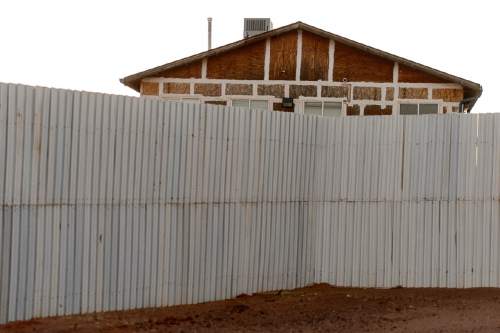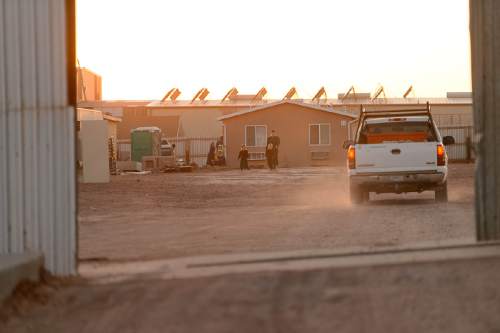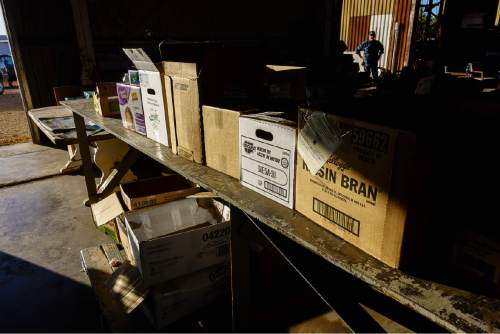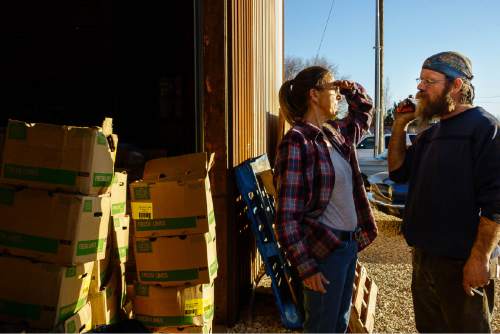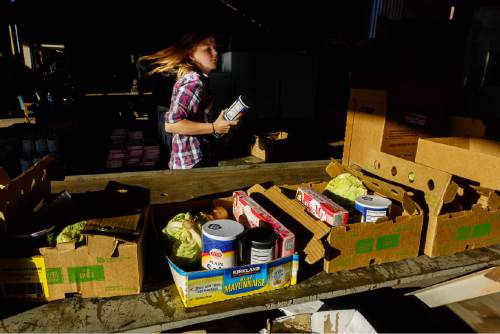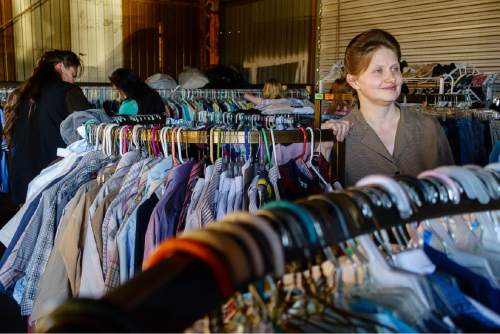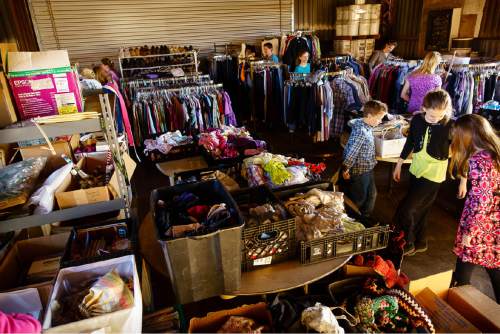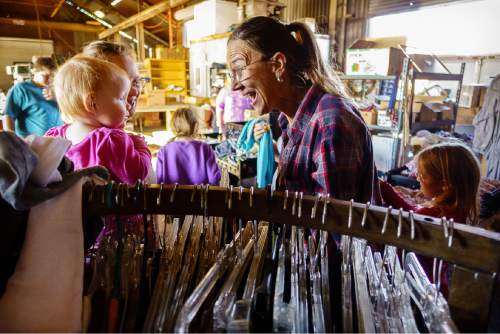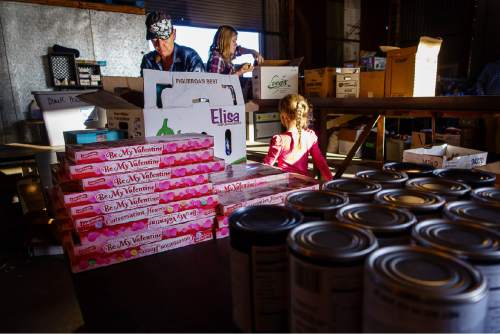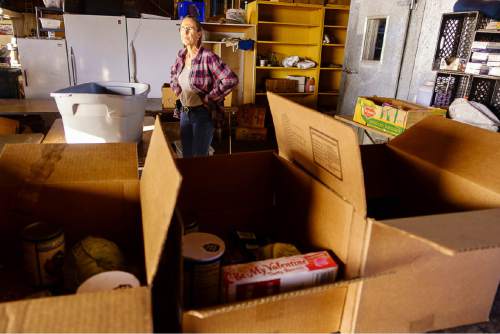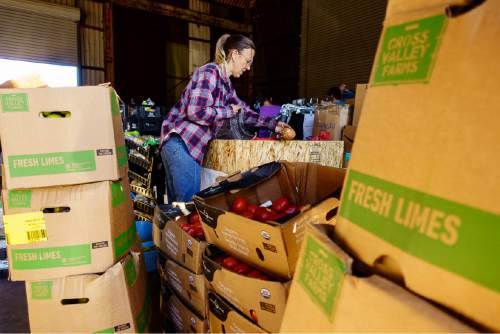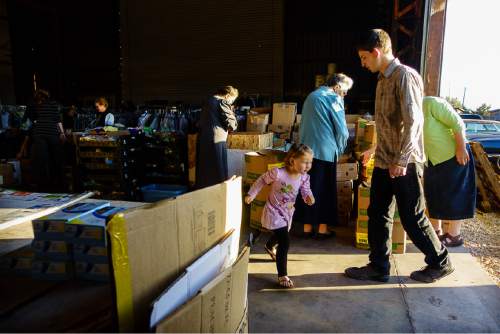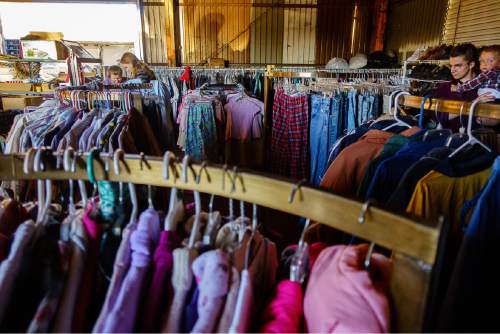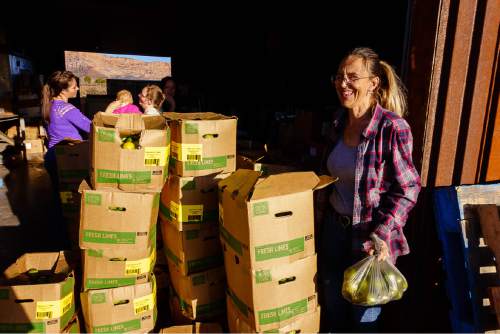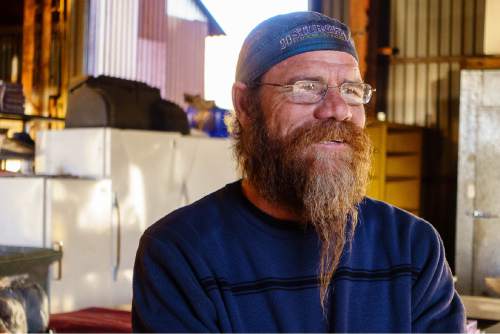This is an archived article that was published on sltrib.com in 2016, and information in the article may be outdated. It is provided only for personal research purposes and may not be reprinted.
Apple Valley • Among members of Utah's largest polygamous sect — where food shortages were already a way of life — there is escalating panic in the wake of arrests tied to allegations of food-stamp fraud, according to volunteers and aid workers close to the Utah-Arizona state line area known as Short Creek.
"We're trying to get everything we can right now," said Phil Jessop, a former Fundamentalist Church of Jesus Christ of Latter-Day Saints member who helps run a food bank at his transmission-repair business just north of Hildale. He is one of several advocates trying to smuggle food through covert networks within the community and into FLDS homes over the restrictions of church leaders.
For years, FLDS members have been commanded to give their food-stamp benefits to the church, according to federal indictments unsealed last week. Food and cash transfers went to the church "storehouse," ostensibly to be redistributed among the members, investigators have said.
But financial troubles and generously preferential food allotments for the families of church leaders have left the shelves bare for many other FLDS families, who have been ordered not to turn anywhere else for food, possibly for fear of losing their church standing and their families.
"The stories I hear about one meal a day, and people being hungry, the restrictions on diets, the restrictions on who can participate in the storehouse and who can't, the requirement to give their money — these people have been through a lot," said Roger Hoole, an attorney who has represented former FLDS members.
Now, with the church's top leaders in jail and the storehouse's supply line apparently broken, charity workers say it is not clear how rank-and-file members — many of them single mothers already reportedly facing extreme food insecurity — will feed their families while remaining obedient to the church.
"They'd rather go hungry and have their children go hungry," Jessop said of the most devout church members. "Those within the order will not come out here [to the food bank]. If they knew they were getting food from us, they wouldn't take it."
—
Living on toast • Food scarcity within the FLDS church turned feeding a family into "an all-day, every-day process," recalled Jennifer Darger, who visited Jessop's Apple Valley transmission repair business on Thursday for the shop's weekly food distribution on behalf of Southwest Recovery Mission Ministries.
Darger left the FLDS about three years ago with eight children.
Before that, she said, they sometimes ate only hot cereal, three meals a day.
The storehouse began as a more robust operation and "was managed successfully for a period of time," according to investigators who interviewed former members and others close to the church as part of the food-stamp fraud case. It previously served only members of the United Order, an elite class deemed "worthy" by church leaders. Other members were required to give their assets to the church but were to get food elsewhere — which made them less loyal, investigators wrote.
Leaders later set up a secondary storehouse system for lower-ranked members "to control more of the population," investigators wrote, but elite families were given priority over the dwindling supplies.
Rather than stock the storehouse, resources were being diverted to legal fees for the church's imprisoned prophet, Warren Jeffs, as well as to the exorbitant costs of publishing Jeffs' prophesies from prison, investigators wrote. Meanwhile, some of the church's wealthiest tithe-payers were expelled, and Jeffs ordered members to abandon farms in Nevada that had supplied much of the storehouse food.
A former storehouse manager, Julie Jeffs, told investigators that "hundreds and hundreds" of people came to the storehouse daily. Fights broke out over items such as hairspray and cold cereal. Meat and vegetables became nearly impossible to get. Many of the home-canned and bottled goods had gone bad, but some members took them anyway out of desperation, she said. Darger recalled visiting the storehouse multiple times each day to see if something new had been added to the shelves.
Julie Jeffs said she occasionally stashed away small amounts of meat for people who weren't aggressive enough to prevail in "the run" that occurred whenever workers brought out beef, fish or poultry.
The shortages did not afflict the church's inner circle, said former member Allene Steed, who told investigators of a trip to the storehouse when she saw two shopping carts chock-full of meat, turkeys, etc., to be taken to leaders' families.
Steed served as personal chef to Lyle Jeffs, Warren's brother, who has run the church in Short Creek since Warren was arrested. When Steed was cooking for Lyle Jeffs, he was "trying to watch his weight" but still indulged in his favorite meal of lasagna and garlic bread, investigators wrote.
Extra food privileges extended to other elite families and people tied to leaders' pet projects. Julie Jeffs said she often arrived at the storehouse in the morning to find preferred members had been allowed inside overnight to take whatever they pleased.
Meanwhile, Steed said, her own children "lived off of toast."
—
Consequences for those who disobey • A few carts of bread, some boxes of canned and fresh vegetables, and an assortment of leftover Valentine's Day candy were on hand Thursday afternoon in Jessop's shop. Darger and other former FLDS members rummaged through the selection, as well as racks of donated clothing, while on the other side of the shop, two mechanics worked underneath the engine compartment of a dump truck.
The lingering question is whether any of the goods will make it onto the tables of FLDS families, who have been ordered to receive their food only from within the church.
The consequences for those who disobey may be dire, Jessop said.
"We were bootlegging some food into Colorado City for three young ladies who were staying with a stepmother. The young ladies called their mother, and they were crying. They were so happy to have some food," Jessop recalled. "Of course they were told to hand their cell phones in and not call their mother. They've been relocated, and we don't know where they're at. Now we don't know how to help these ladies."
At least one of the three sisters appeared in the background of widely-circulated cellphone footage from a deadly flash flood that swept through Short Creek this summer and killed 13 women and children, Jessop said. Their mother saw the video and "came running to town to try to locate them and was unable to," Jessop said.
The Southwest Recovery Mission tries to work in the fringes of the FLDS community, collecting food from donors and providing it to people who still have enough access to members to make deliveries without the church — or even the recipients themselves — learning where the food came from.
"We do not keep documentation of names or family members," Jessop said. "We have allowed the people to stay anonymous because of the religious threat that looms over them."
One woman, with family still in the church, frequently fills her car with food to the point "she can barely drive" and secrets it to members with whom she still has trust, Jessop said.
"I have no idea how many families she's trying to support," he said. "If the powers that be found out what she was doing, she would never see her children again. ... She's walking a real fine line, and taking a really high risk doing what she's doing."
A food bank in Fredonia, Ariz., makes similar bulk transfers. Hazel Hatch, director of Care and Share, said her site serves about 200 families in Colorado City who have enough distance from the church to visit the pantry without scrutiny.
"I don't ask any questions. I just say, 'How many boxes?' and they sign their names," she says.
Charity workers say donated food may pass through multiple hands as it makes its way through varying degrees of church loyalty, from apostates to probational members to faithful believers who may not curry enough favor to be fed adequately by the church, but feel they cannot accept food from outsiders.
That group may be the most vulnerable as FLDS members move forward following this week's charges by federal prosecutors against Lyle Jessop and 10 others accused of food-stamp fraud.
—
Government food benefits to continue • Although federal agents have not reported seizing food from the storehouse, Southwest Rescue Mission director Donna McGinnis said she has learned it is no longer operating. Meanwhile, many members already likely have given their month's food benefits to the church. And, although state officials in both Utah and Arizona have announced that food benefits will continue to be disbursed to FLDS members, there is no way to know whether members will be willing to use those benefits in defiance of instruction not to acquire food outside the church, McGinnis said. Neither federal investigators nor local law enforcement have said whether food cards in the community will be monitored to prevent further sharing of benefits with the church.
Among the most critical unknowns: What will FLDS leaders tell members to do? Members at the church's compound in Pringle, S.D. were prevented from using food stamps at all, investigators wrote.
"No one can actually determine what will happen, and to speculate is an impossibility," McGinnis said. "But I do believe that some of the people will proceed in the proper way in using their food stamps. ... They're seeing firsthand what has happened, and ... it's put enough fear and disruption that some people are going to stop and think."
How to help
Southwest Recovery Mission Ministries is registered as a non-profit organization with the state of Nevada. Phil Jessop, who helps run its food bank near Hildale and Colorado City, said it is looking for more suppliers, especially donations of meat and produce. Anyone interested in donating can learn more on the organization's website: http://www.southwestrecoverymissionministries.org. Rulon Mormon Barlow , the 10th defendant indicted on allegations of misusing food stamps surrendered Saturday. He was booked into the Washington County Jail in Hurricane. He will appear Monday before a federal judge in St. George, according to the U.S. Attorney's office.
Barlow served as the general manager of Meadowayne Dairy Store and is accused of transferring food stamp fraud proceeds to accounts associated with Quality Wholesale Distributors.
Eleven people were indicted in the scheme. Only one defendant, Kimball Dee Barlow, has not been apprehended or surrendered.
— Nate Carlisle


